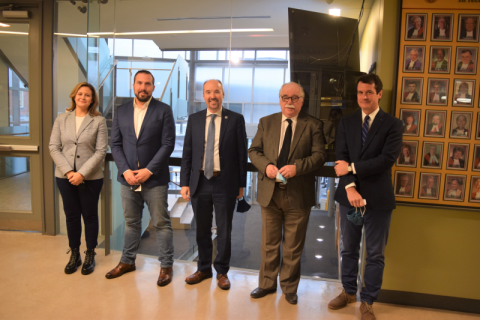
In their Election Law class yesterday, students met local political figures and questioned them about current public issues in which law, public policy, and politics are intertwined. Representatives from all levels of government addressed such issues as the impact of COVID-19, the participation of women in politics, and the effort to include Indigenous voters.
“It was one of the most authentic and intellectual conversations about politics from politicians I have experienced,” says Erin Curtis, Law’23. “It was exciting to discuss election law, representation, and electoral reform devoid of a party platform.”
Derek Hooper, Law’23, agrees. “It was refreshing to get to interact with politicians openly and hear them speak so candidly,” he says.
The local representatives visiting Gregory Tardi’s class were:
- Bryan Paterson (MA’01, PhD’07), Mayor of Kingston;
- Ian Arthur, Member of Provincial Parliament for Kingston and the Islands; and
- Colby Pereira (Artsci'13, MA'15), Constituency Assistant to Mark Gerretsen (Artsci’06), Member of Parliament for Kingston and the Islands.
In addition to hot-button issues, the guests also talked about the experience of being a candidate, various aspects of campaigns, and serving in their political roles.
Hooper enjoyed one aspect in particular. “They addressed the more performative and rehearsed elements of politics, while also being forthcoming in the fact that you can be directly opposed on an issue with a colleague, but still be great friends at the end of the day,” he says.
For Curtis, “The event showed first that many of the same issues persist at all levels of government; it is just a question as to the scale. The representatives each brought a different experience and were most often agreeing on areas that require change.”
She asked about the representation of women in politics. “It was interesting to see that the issue is not isolated and cannot be resolved without lessening barriers to entry into politics at all levels,” she says. “It was a great experience to hear from all levels of government and to learn that in terms of systematic issues, they have more in common than not.”
For course instructor Tardi, former Senior Parliamentary Counsel at the House of Commons, a visit by local politicians is the best way to end his course. “In Election Law, we examine the subject-matter systematically, situating the relevant legal rules as a major component of Democracy, outlining the characteristics of the Canadian regime on elections and delving into each phase of an election, from dissolution to the convening of the next Parliament and the formation of government,” he explains. “Study of this process would be incomplete without the experience of public officials who have lived through it and who now hold public office and exercise public authority as a result of it.”
There was an added benefit of yesterday’s class. “This conversation made me hopeful for the future of politics in Canada,” says Curtis. “Where systematic issues persist, public servants as dedicated to the cause as our speakers make me optimistic for change.”
By Lisa Graham